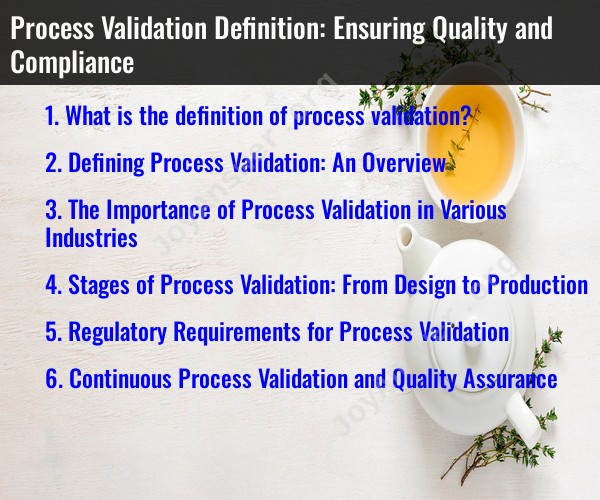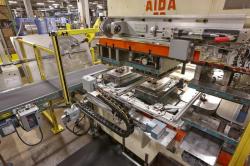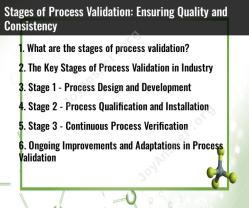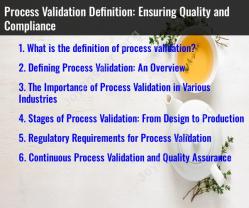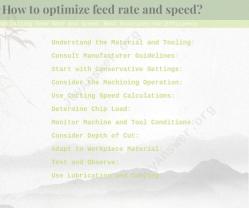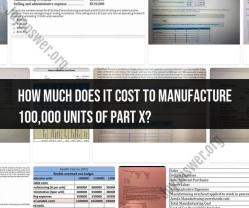What is the definition of process validation?
Process validation is a systematic and documented approach used in various industries, particularly in pharmaceuticals, medical devices, and manufacturing, to ensure that a specific process consistently produces products or results that meet pre-established quality and compliance criteria. The primary goal of process validation is to confirm that a particular process is capable of consistently meeting its intended specifications and performance requirements.
In essence, process validation involves a series of activities and tests that are designed to:
- Establish that the process is well-defined and properly designed.
- Confirm that the process is capable of consistently producing products or results that meet quality and performance standards.
- Demonstrate that the process remains in a state of control during routine production or operation.
- Ensure compliance with relevant regulatory and quality standards and guidelines.
Process validation typically includes three stages:
Stage 1 - Process Design: In this stage, the process is thoroughly designed, including the selection of equipment, materials, and operating parameters. Risk assessment and mitigation strategies are often considered.
Stage 2 - Process Qualification: This stage involves running the process with a limited number of runs to demonstrate that it consistently produces products or results within specifications. This phase may include the development of standard operating procedures (SOPs) and the training of personnel.
Stage 3 - Continued Process Verification: After successful qualification, ongoing monitoring and control of the process are required to ensure that it continues to operate within established parameters and quality standards. This may involve regular monitoring, data analysis, and periodic requalification or revalidation as necessary.
Process validation is essential for industries where product quality and safety are critical, as it helps prevent defects and deviations, ensures compliance with regulations, and ultimately safeguards the interests of consumers and patients. The specific requirements and guidelines for process validation may vary depending on the industry and the regulatory bodies overseeing it.
Defining Process Validation: An Overview
Process validation is a systematic approach to ensuring that a manufacturing process can consistently produce a product that meets its predetermined specifications and quality characteristics. It involves collecting and evaluating data at all stages of the process, from design to production, to demonstrate that the process is capable of consistently producing high-quality products.
Process validation is important in a wide range of industries, including pharmaceutical, food and beverage, medical device, and manufacturing. It is particularly important in industries where product quality and safety are critical, such as the pharmaceutical industry.
The Importance of Process Validation in Various Industries
Process validation is important in various industries for the following reasons:
- To ensure product quality and safety: Process validation helps to ensure that products are consistently produced to meet their predetermined specifications and quality characteristics. This is important to ensure that products are safe and effective for consumers to use.
- To comply with regulations: Many industries have regulations that require companies to validate their manufacturing processes. This is particularly true in highly regulated industries such as the pharmaceutical industry.
- To reduce costs: Process validation can help to reduce costs by identifying and eliminating potential problems early on. This can lead to fewer product recalls and customer complaints.
- To improve efficiency: By validating their processes, companies can identify areas where efficiency can be improved. This can lead to reduced production costs and faster time to market for new products.
Stages of Process Validation: From Design to Production
The four stages of process validation are:
- Process design: At this stage, the process is designed and documented. This includes identifying the critical process parameters and establishing acceptable ranges for each parameter.
- Process qualification: At this stage, the process is tested to ensure that it meets the design specifications. This includes testing the equipment, instrumentation, and control systems.
- Continued process verification: At this stage, the process is monitored on an ongoing basis to ensure that it remains in control. This includes monitoring the critical process parameters and taking corrective action if necessary.
- Revalidation: At this stage, the process is revalidated whenever there is a significant change to the process or its inputs or outputs. This is to ensure that the process remains capable of producing high-quality products.
Regulatory Requirements for Process Validation
Many industries have regulations that require companies to validate their manufacturing processes. For example, the Food and Drug Administration (FDA) requires pharmaceutical companies to validate their manufacturing processes to comply with the Current Good Manufacturing Practices (CGMP) regulations.
The specific regulatory requirements for process validation vary depending on the industry. However, all of the regulations require companies to collect and evaluate data to demonstrate that their processes are capable of consistently producing high-quality products.
Continuous Process Validation and Quality Assurance
Process validation is an ongoing process. Companies should continuously monitor their processes and make adjustments as needed to ensure that they remain in control. This is called continuous process validation.
Continuous process validation is important for maintaining product quality and safety. It also helps companies to comply with regulatory requirements.
Quality assurance is an important part of process validation. Quality assurance professionals help to ensure that the process validation procedures are followed and that the data is collected and evaluated accurately.
Conclusion
Process validation is an essential part of ensuring product quality and safety in a wide range of industries. It is important for companies to understand the importance of process validation and to develop and implement effective process validation procedures.
